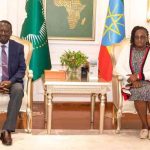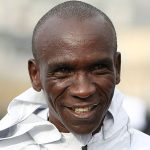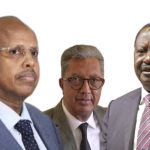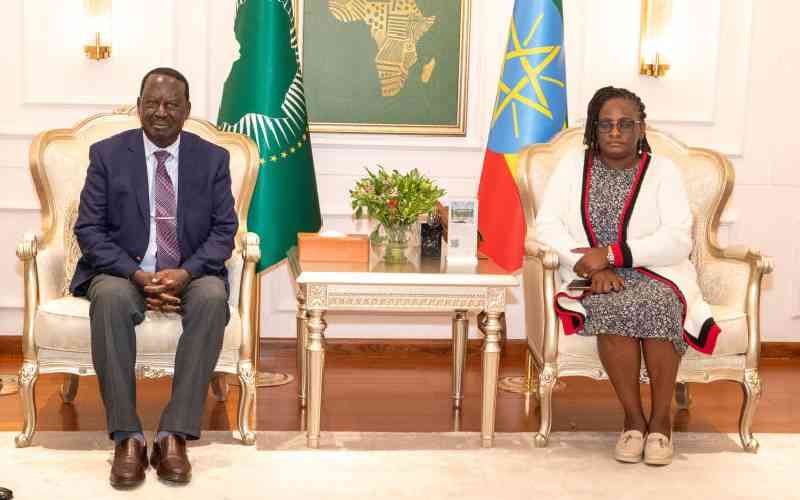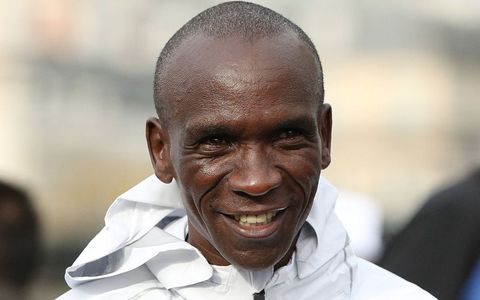The clock is ticking as Africa braces for the high-stakes African Union Commission (AUC) elections in Addis Ababa, Ethiopia. In just a few hours, the continent is expected to know the successor to chairperson, Moussa Faki of Chad, whose eight-year tenure is drawing to a close.
Kenya is no stranger to the AUC race, having last fielded a candidate in 2016 when Foreign Affairs Cabinet Secretary Amina Mohamed contested. Despite intense lobbying across 51 African nations, Mohamed finished second in the 2017 elections, amid allegations of betrayal by allies and neighboring countries, who reportedly supported her only in the first round.
Fast forward to 2024, and Kenya has re-entered the fray, this time with former Prime Minister Raila Odinga as its candidate.
President William Ruto officially announced Raila’s candidacy in August, 2024, during a high-profile event at State House, attended by regional leaders, including Presidents Yoweri Museveni of Uganda, Samia Suluhu of Tanzania, and Salva Kiir of South Sudan, as well as former presidents Jakaya Kikwete of Tanzania and Olusegun Obasanjo of Nigeria.
“Raila is a celebrated statesman whose longevity in leadership has been sustained by an unrelenting devotion to democratic change as the foundation of sustainable freedom and prosperity,” the President said.
What followed were grueling campaigns in Africa and beyond and in several instances, Raila accompanied the President to some of the international events attended by African heads of State to drum up his support.
Raila was later to announce that he would retire from active politics to focus on his AUC dream, a move that was received with mixed reactions.
“I am not going to be very active in Kenyan politics henceforth as I continue now to focus my attention on the continental campaign,” he said.
“Shifting focus on a continental campaign does not mean that Kenya ceases to exist. This is a transitional phase as we move continental.”
Some analysts stated that Raila’s absence in local political discourse would lead to major alignments even as questions emerge on whether his influence would remain.
Wiper Party Leader, Kalonzo Musyoka, a co-principal in Azimio la Umoja coalition, came out and declared that there was no power vacuum.
“Yes, I am ready to be the leader of the official Opposition. This is the team. You will see the Opposition like never before. We may be light in numbers in Parliament but outside we have the people of Kenya,” he said.
There was a general feeling from Kalonzo’s allies that Raila’s exit from local politics offered him a better chance having postponed his bid in Raila’s favour thrice.
Kalonzo, who has been on the front line wishing Raila the best in his candidacy, earlier this month urged Raila to retire in the event he loses.
Stay informed. Subscribe to our newsletter
“I don’t see how Raila Odinga would lose the chairmanship and come back and say he wants to lead Azimio. I would be amazed personally. That would not be the Raila I know. He must also have a reality check. For now, the option is he goes if he wins beautiful for himself, the country and the continent.
“If he loses, I think he should simply retire. I would advise Raila to retire, and join former President Uhuru Kenyatta in that capacity. Retired statesmen.”
But a few days ago, he seemingly changed tune. “Raila is going to look for the African Union seat and I’m telling him to go but if things don’t go well, he should come back so that we liberate Kenya,” he said.
Prior to President Ruto forming the so-called broad-based government, succession politics had already emerged with Cabinet Secretaries Hassan Joho and Wycliffe Oparanya, who are former ODM deputy party leaders, eyeing the Raila seat.
Their ambitions were, however, cut short after they were picked by Ruto to serve in his Cabinet, a move taken as a strategy to inherit Raila’s strongholds by picking his loyalists.
In October, Raila said he had temporarily stepped down from all roles in the party, and handed over the leadership to Kisumu Governor Anyang’ Nyong’o.
“The Central Committee of our party made this decision a few weeks ago, picking a man who has been central in giving direction and firm foundation to our party since inception,” he said.
As the AUC elections approach, opinions remain divided. Githunguri MP Gathoni Wamuchomba has called for Raila’s retirement if he fails to secure the AUC seat, advocating for younger leadership.
“If he does not get it, he just needs to go and retire,” she said, adding, “Next election, we will elect a young president and a young woman deputy president… We will give him a very good retirement package as an ex-Prime Minister.”
A section of Kenyans, especially on social media, have been against Raila’s candidacy, some even declaring their support of his competitor from Djibouti, Mahmoud Ali Youssouf.
Pro-government politicians have, however, been dismissing critics of the Raila candidature as being unpatriotic.
Prime Cabinet Secretary Musalia Mudavadi, who heads the Foreign and Diaspora Affairs docket, dismissed the critics as negative energy.
Homa Bay MP, Peter Kaluma stated: “I want to tell those who are attacking Raila on the social media for another candidate from outside, that cannot be more unpatriotic. We need to know there are things we should converge as all Kenyans.”
Mudavadi has also dismissed claims that the government had ferried people to Addis Ababa in anticipation of Raila’s victory, claiming that supporters were travelling privately to give moral support to the former Prime Minister.
“We have been informed that tens of people and possibly in their hundreds were scheduled to privately travel to Addis Ababa, including those who will be using buses. It reflects patriotism. This will not be a Raila victory but that of Kenya as a whole,” said CS.
He also refuted claims that the government was funding supporters to travel to Addis Ababa, claiming that patriotic Kenyans were traveling privately to support Raila.
And on Thursday in the National Assembly, Speaker Moses Wetangula said he had received notifications from 40 MPs who would be travelling to Addis in solidarity with Raila.
“For clarity, these members will be traveling in their private capacities as leaders and citizens thus will be self-sponsored. It is important to understand that it not unusual for citizens of a country including MPs to sponsor themselves to such high level international forum,” he said.
“I say so because we have seen the usual barrage against Parliament, that Parliament has sent 100 members to Addis Ababa. We can even very well go if we can be able to sponsor ourselves but Parliament does not have the resources to sponsor 100 members. So let us give some foot thumping to those who have bought their own ticket and gone to Addis, one of the very expensive cities in Africa. An average hotel is $450 a night.”
